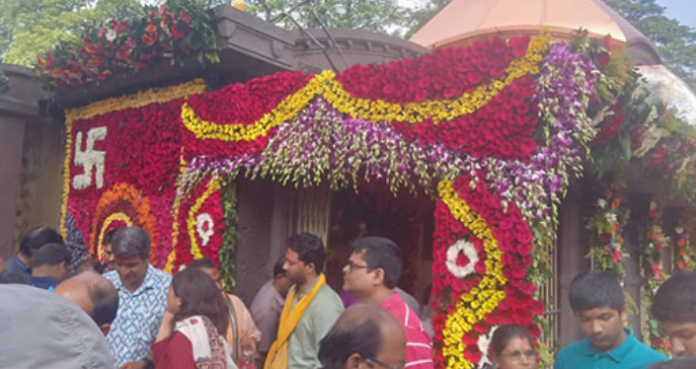Devotees thronged the Kamakhya Temple in Guwahati on Sunday, the first day of Shardiya Navratri.
Long queues of devotees were seen inside the temple premises to worship goddess Durga and her nine incarnations.
The Kamakhya Temple at Nilachal Hills in Assam’s Guwahati is one of the oldest and most revered centres of Tantric practices, dedicated to the goddess Kamakhya.
The temple is the centre of the Kulachara Tantra Marga and the site of the Ambubachi Mela, an annual festival that celebrates the menstruation of the goddess.
The Kamakhya temple has been famous for black magic for decades and has been in light for its special puja to remove any black magic and Vashikaran Kriya.
Earlier in the day, ‘Jai Ambe Gauri Aarti’ was performed at Delhi’s Jhandewalan temple, to mark the first day of the nine-day festival, Navratri that will continue till October 24.
Devotees could be seen offering prayers at Delhi’s Jhandewalan temple, on the first day of the festival.
Similarly, devotees offered prayers to the Hindu goddesses at the Mumba Devi Temple in Mumbai.
A large number of worshippers were en route to Mata Vaishno Devi temple in Katra to offer prayers on the first day of Navratri.
“We have come here from UP’s Muzaffarnagar. We are going to Bhawan to offer prayers. A large number of people have come here on the occasion of Navratri,” said a devotee in Katra.
The Maa Durga Temple in Uttar Pradesh’s Prayagraj was filled with devotees early this morning on the occasion of the first day of Navratri.
Worshippers also thronged Ashtbhuji Mata Temple in Varanasi, on the first day of the occasion.
Prime Minister Narendra Modi on Sunday greeted people on the occasion of the beginning of Navratri and wished them happiness, fortune and good health.
“May Shakti Pradayini Maa Durga bring happiness, prosperity, good fortune and good health in everyone’s life. Jai Mata Di!” PM Modi posted on X in Hindi.
During the nine-day Navratri festival, devotees worship Maa Durga’s nine incarnations in order to obtain her blessings. There is a goddess manifestation linked with each day of Navratri.
People maintain ritualistic fasts, recite shlokas dedicated to each goddess, wear new clothing, offer bhog, and clean their homes during these nine days.
In their prayers, they ask the goddess for her favour in order to have prosperous, joyous, and fulfilled lives.
Over the next nine days, devotees offer their prayers to Goddess Durga and observe fasts.
The festival of Navratri honours the defeat of the demonic Mahishasura and the triumph of good over evil. The 10th day of Sharad Navratri is celebrated as Dussehra or Vijaya Dashami.
Ramlila is organised extensively during Navratri in North India, particularly in Uttar Pradesh, Uttarakhand, Haryana, Gujarat, and Madhya Pradesh. During the Ramlila, the tale of Lord Ram’s triumph over Ravana is acted out.
Numerous dances, including Garba and Dandiya Raas, are performed during the nine-day festival. While Dandiya Raas involves dancing with dandiya sticks to the beat of the music, Garba is a traditional dance in which participants clap their hands and move in a circle while making rhythmic gestures.
The effigies of Ravana are burned on Dussehra to commemorate the triumph of good over evil.





